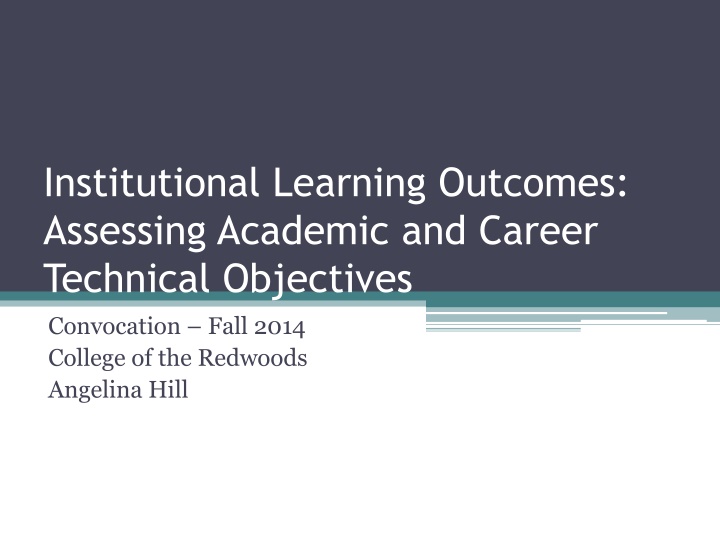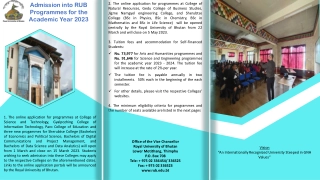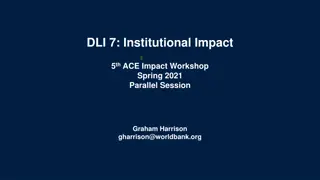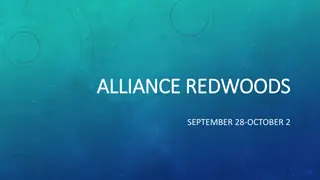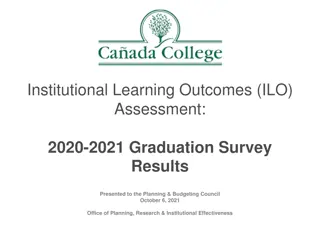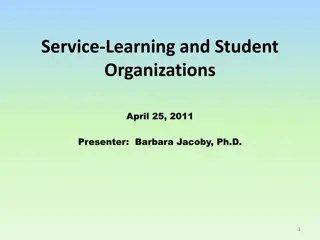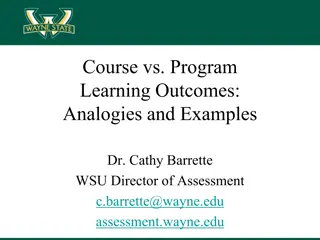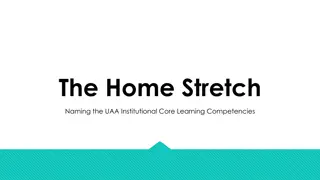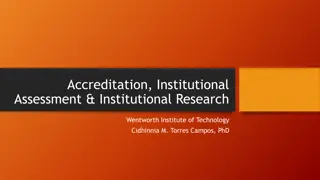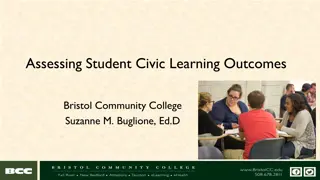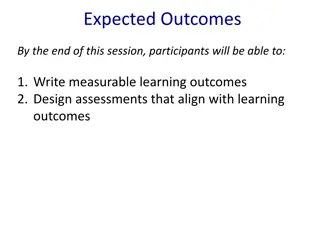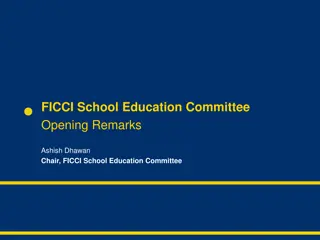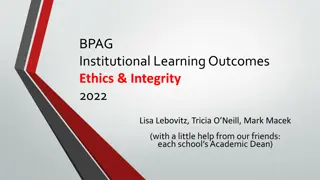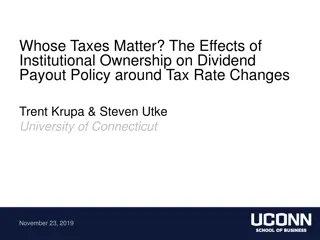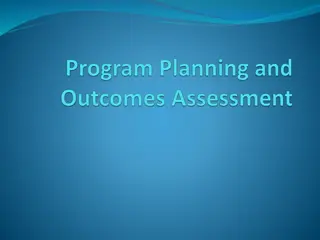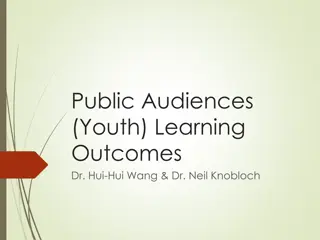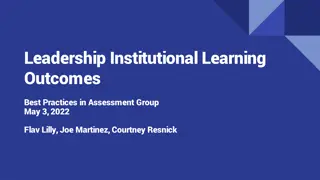Assessing Institutional Learning Outcomes at College of the Redwoods
College of the Redwoods evaluates three key Institutional Learning Outcomes: Academic & Career Technical Objectives, Personal and Professional Development, and Community and Global Responsibility. The assessment tools include program data evaluation, surveys, and student engagement activities to ensure students meet their educational and personal goals while contributing to local and global communities.
Download Presentation

Please find below an Image/Link to download the presentation.
The content on the website is provided AS IS for your information and personal use only. It may not be sold, licensed, or shared on other websites without obtaining consent from the author.If you encounter any issues during the download, it is possible that the publisher has removed the file from their server.
You are allowed to download the files provided on this website for personal or commercial use, subject to the condition that they are used lawfully. All files are the property of their respective owners.
The content on the website is provided AS IS for your information and personal use only. It may not be sold, licensed, or shared on other websites without obtaining consent from the author.
E N D
Presentation Transcript
Institutional Learning Outcomes: Assessing Academic and Career Technical Objectives Convocation Fall 2014 College of the Redwoods Angelina Hill
ILO 1: Academic & Career Technical Objectives Students will successfully acquire program outcomes and complete degrees and/or certificates. This institutional outcome indicates if the objectives stated for degrees and/or certificates are being met. Students earning degrees will acquire the College s general education outcomes: Effective Communication, Critical Thinking, and Global/Cultural Context. Possible assessment tools: Program assessment data General Education Outcomes assessment data Degree/Certificate completion rates Transfers & transfer eligibility External accreditation of programs
ILO 2:Personal and Professional Development Students will reach their career, transfer, or personal goals. This outcome indicates if a student's individual goals are being met. This includes the goals of students earning degrees, or of students taking only a few courses for training and/or personal enrichment. Possible assessment tools: Graduating exit survey CTE employment survey External licensure and certifications Students with comprehensive SEPs Student Satisfaction Inventory Students declaring a CTE- or transfer-related degree or certificate (vs. enrichment) Meeting/Exceeding SLO expectations use of existing course assessment reports.
ILO 3: Community and Global Responsibility Students will develop the awareness and skills needed to contribute to local and global communities. This outcome indicates if students recognize ways to contribute to their community and the value of effectively engaging in cross- cultural environments. Possible assessment tools: Student awareness and appreciation of diverse perspectives (exit survey) Service learning and internship work Student club service work; community outreach performed by student athletes Student awareness of, and attitudes toward campus activities and services related to diverse student populations (survey) Class and club community activities (survey of faculty and clubs)
ILO 1: Academic & Career Technical Objectives Possible assessment tools: Program assessment data General Education Outcomes assessment data Degree/Certificate completion rates Transfers & transfer eligibility External accreditation of programs
Program Assessment Data Programs were evaluated looking at 63 courses. 1/63 (1.6%) Did not meet 39/63 (61.9%) Met 23/63 (36.5%)Exceeded Nearly all courses indicated successful delivery of program-level outcomes
Course Assessment Data 100% 90% 80% 70% 60% 50% 40% Above Met Below 30% 20% 10% 0%
ILO 1: Academic & Career Technical Objectives Possible assessment tools: Program assessment data General Education Outcomes assessment data Degree/Certificate completion rates Transfers & transfer eligibility External accreditation of programs
General Education Assessment Critical Thinking Does not meet 9.2% 3.9% 11.0% 15.4% 0.0% # courses evaluated 14 4 6 3 1 # Spring 2013 GE Area Overall A: Natural Sci B: Social Sci C: Human D: Lang & Rat Exceeds 56.8% 64.6% 58.6% 35.4% 60.0% Meets 34.0% 31.5% 30.4% 49.2% 40.0% Participants 403 127 201 65 10 Does not meet 19.10% 11.81% 27.65% 11.11% 30.95% # courses evaluated 21 5 7 5 4 GE Area Overall A: Natural Sci B: Social Sci C: Human D: Lang & Rat Exceeds 38.21% 44.73% 30.59% 36.67% 36.90% Meets 42.69% 43.46% 41.67% 52.22% 32.14% Fall 2012
General Education Assessment Global/Cultural Context Does not meet 16.0% 11.5% 27.5% 19.4% 2.2% # # # courses evaluated 13 3 2 4 4 GE Area Overall A: Nat Sci B: Soc Sci C: Human D: Lang & Rat Exceeds 47.9% 57.7% 38.1% 55.6% 51.5% Meets 36.2% 30.8% 34.4% 25.0% 46.3% Participants 420 52 160 72 136 N/A 50 5 15 7 23 Spring 2012
General Education Assessment Effective Communication Does not meet 9.5% 12.1% 8.2% 8.1% 10.2% # # # courses evaluated 14 4 3 3 4 GE Area Overall A: Nat Sci B: Soc Sci C: Human D: Lang & Rat Exceeds 50.9% 61.5% 52.7% 56.8% 40.8% Meets 39.6% 26.4% 39.1% 35.1% 49.0% Participants 505 91 220 37 157 N/A 73 20 31 12 10 Fall 2012
ILO 1: Academic & Career Technical Objectives Possible assessment tools: Program assessment data General Education Outcomes assessment data Degree/Certificate completion rates Transfers & transfer eligibility External accreditation of programs
Degree/Certificate Completions Completers by gender 2010-11, 2011-12, 2012-13 All enrolled degree-seeking students Gender Completers Degree/Cert Seeking Cohort Completion rate Female 3045 961 32% Male 2501 579 23%
Degree/Certificate Completions Completers by age 2010-11, 2011-12, 2012-13 degree-seeking students Age Completers Completion rate Degree/Cert Seeking Cohort 3096 671 22% 24 and younger 25 - 34 35 - 49 50 and older 1534 639 277 512 237 119 33% 37% 43%
Degree/Certificate Completions Completers by ethnicity 2010-11, 2011-12, 2012-13 degree-seeking students Ethnicity Progressed Total Not Progressed Progression Rate Hispanic American Indian 68 70 32 35 100 105 32% 33% White Unknown 521 98 357 75 878 173 41% 43%
Completions (2008-09 to 2012-13) Row Labels Liberal Arts: Behavioral & Social Sciences Liberal Arts: Humanities & Communications Liberal Arts: Science Exploration CSU General Education Requirements NURS Registered Nursing - AS AJ Basic Law Enforcement Academy - CA ECE Early Childhood Education - CA NURS Licensed Vocational Nursing - CA GENED General Studies - AS DA Dental Assisting - CA CT Fine Woodworking I - CA NURS Licensed Vocational Nursing - AS Liberal Arts: Business General Studies ADCT Addiction Studies - CA NURS LVN to RN Career Mobility - AS Liberal Arts: Fine Arts DA Dental Assisting - AS MA Medical Assisting - CA ECE Early Childhood Education - AS BUS General Business - AS Sum of Total Sum of Percent 447 228 213 211 187 162 149 142 96 91 88 79 71 69 59 56 54 51 46 35 27 14.6% 7.5% 7.0% 6.9% 6.1% 5.3% 4.9% 4.7% 3.1% 3.0% 2.9% 2.6% 2.3% 2.3% 1.9% 1.8% 1.8% 1.7% 1.5% 1.1% 0.9% CT Fine Woodworking II - CA MA Medical Assisting - AS DM Digital Media - AS Liberal Arts: Science AJ Administration of Justice - AS CT Cabinetmaking & Millwork - CA CIS Networking - AS CT Residential Construction I - CA Liberal Arts: Mathematics CT Residential Construction II - CA CT Construction Technology - AS DT Architectural Drafting - AS MS Marine Science - AS MT Manufacturing Technology - CA CT Historic Preservation & Restoration - CA IGETC General Education Requirements AG Plant Science - AS 27 26 24 23 20 20 19 18 18 17 16 16 15 13 0.9% 0.9% 0.8% 0.8% 0.7% 0.7% 0.6% 0.6% 0.6% 0.6% 0.5% 0.5% 0.5% 0.4% 12 0.4% 12 10 0.4% 0.3%
Degree/Certificate Completions IPEDS 150% graduation rate first-time full-time degree/cert seeking students 2009 CR cohort = 13%, Comparison group = 21% 2008 CR cohort = 4%, Comparison group = 20% 2007 CR cohort = 6%, Comparison group = 21%
Transfer-out rate IPEDS transfer rate first-time full-time degree/cert seeking students, 2009 CR cohort = 10%, Comparison group = 15% 2008 CR cohort = 18%, Comparison group = 17% 2007 CR cohort = 23%, Comparison group = 20%
2012-2013 CSU Transfers COMMUNITY COLLEGES COLLEGE OF THE REDWOODS BA CHI DH FRE FUL HUM LB LA NOR 1 6 1 1 1 180 1 1 1 SAC SB SD SF SJ SLO SON TOTAL 11 1 2 6 1 3 3 220
Transfers to HSU 2012-2013: 180 2011-2012: 175 2010-2011: 162 2009-2010: 137 2008-2009: 154 2007-2008: 221 2006-2007: 227 2005-2006: 244 2004-2005: 247 2003-2004: 274
FTES at CR 8000 7000 6000 5000 4000 3000 2000 1000 0
Conclusion ILO: Students will successfully acquire program outcomes and complete degrees and/or certificates. This institutional outcome indicates if the objectives stated for degrees and/or certificates are being met. Students earning degrees will acquire the College s general education outcomes: Effective Communication, Critical Thinking, and Global/Cultural Context. There is evidence of successful attainment of program outcomes and general education outcomes.
Conclusion Students do not always earn declared degrees or certificates for many reasons Declared degree/cert may not be accurate Employment opportunity may present itself Value of degree/certificate may be unclear
What next? In what ways do we have room for improvement? What can we do to help students?
